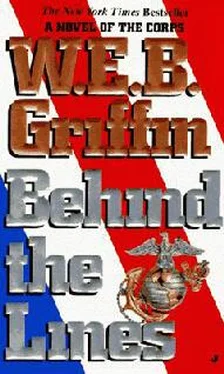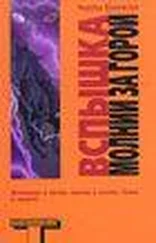W.E.B. Griffin - The Corps VII - Behind the Lines
Здесь есть возможность читать онлайн «W.E.B. Griffin - The Corps VII - Behind the Lines» весь текст электронной книги совершенно бесплатно (целиком полную версию без сокращений). В некоторых случаях можно слушать аудио, скачать через торрент в формате fb2 и присутствует краткое содержание. Жанр: prose_military, на английском языке. Описание произведения, (предисловие) а так же отзывы посетителей доступны на портале библиотеки ЛибКат.
- Название:The Corps VII - Behind the Lines
- Автор:
- Жанр:
- Год:неизвестен
- ISBN:нет данных
- Рейтинг книги:3 / 5. Голосов: 1
-
Избранное:Добавить в избранное
- Отзывы:
-
Ваша оценка:
- 60
- 1
- 2
- 3
- 4
- 5
The Corps VII - Behind the Lines: краткое содержание, описание и аннотация
Предлагаем к чтению аннотацию, описание, краткое содержание или предисловие (зависит от того, что написал сам автор книги «The Corps VII - Behind the Lines»). Если вы не нашли необходимую информацию о книге — напишите в комментариях, мы постараемся отыскать её.
The Corps VII - Behind the Lines — читать онлайн бесплатно полную книгу (весь текст) целиком
Ниже представлен текст книги, разбитый по страницам. Система сохранения места последней прочитанной страницы, позволяет с удобством читать онлайн бесплатно книгу «The Corps VII - Behind the Lines», без необходимости каждый раз заново искать на чём Вы остановились. Поставьте закладку, и сможете в любой момент перейти на страницу, на которой закончили чтение.
Интервал:
Закладка:
Two additional officers appeared at the mess; that is to say, the porch of General Fertig's quarters trembled as someone started up the ladderlike stairs. When they looked, two men appeared. One was dressed like General Fertig, in baggy white cotton shirt and trousers and a crude straw hat. He had a Thomp-son.45 caliber submachine gun slung from his shoulder.
The second was wearing a battered khaki uniform. The sleeves of his khaki shirt-onto the collar points of which were pinned the railroad tracks of a cap-tain and the crossed flags of the Signal Corps-had been torn off above the elbows, and his khaki trousers had been torn off above the knees. He wore a pith helmet and a web belt, from which hung a.1911A1.45 automatic in a leather holster green with mildew. He had a 1917 Enfield.30-06 rifle slung from his shoulder. He carried a rucksack-obviously heavy-in his hand.
"Introductions are apparently in order," he said. "Gentlemen, my chief of staff, Captain Charles Hedges. Hedges, this is Captain Weston, a Marine offi-cer who has placed himself and his men-including Lieutenant Everly-under our command. You know Lieutenant Ball."
Hedges wordlessly shook Weston's and Everly's hands.
"General, this is Captain Buchanan," Hedges said. "Late of General Sharp's headquarters."
"I believe I met the Captain," Fertig said.
"Yes, Sir," Buchanan said. "You were a colonel at the time."
"A lieutenant colonel, to be precise," Fertig said, ignoring what could have been an accusation. "How are you, Buchanan?"
"Very well, Sir, thank you."
"Can I offer you some breakfast?"
"Yes, Sir. Thank you."
"Sergeant!" Fertig called, raising his voice. The Filipino sergeant ap-peared. "Will you get these gentlemen some breakfast, please?"
"Yes, Sir."
"Sit down, please, gentlemen," Fertig said, and then looked intently at Buchanan. "You're aware, of course, that General Sharp was ordered by Gen-eral Wainwright to surrender his command to the Japanese?"
"Yes, Sir."
"Do I correctly infer by your presence here that you saw it as your duty not to enter into Japanese captivity?"
"Yes, Sir."
"And you are willing to place yourself... Are you alone, Captain?"
"No, Sir. I have eight men, Americans, with me."
"Are you willing to place yourself and your men under my command?"
"Yes, Sir."
"Welcome to United States Forces in the Philippines," Fertig said, lean-ing across the table to shake Buchanan's hand. "After you've had your break-fast, we'll have a private chat."
"Yes, Sir."
"In the meantime-curiosity overwhelms me-what does that bag con-tain? It seems unusually heavy."
"It's an M94, Sir," Buchanan said. "Device, Cryptographic, M94."
"Enlighten me," Fertig said.
Buchanan put the bag on the table, unfastened the straps, and took from it a small metal box. On the top was a small brass plate.
=SECRET=
DEVICE, CRYPTOGRAPHIC, MODEL 94
SERIAL NUMBER 145
IT IS ABSOLUTELY FORBIDDEN TO REMOVE THIS DEVICE
FROM ITS ASSIGNED CRYPTOGRAPHIC FACILITY
=SECRET=
"Things... collapsed... so quickly, Sir, that I didn't have a chance to destroy this," Buchanan said. "I didn't want the Japs to have the chance to see how it works. They could have, if I had only rendered it inoperable-by shoot-ing it up, or burning it-so I took it with me. With the idea of throwing it into the sea. If I buried it somewhere, and was subsequently captured, the Japanese are very good at interrogation...."
"This thing works?" Fertig asked.
"Yes, Sir."
"Frankly, Captain, I was hoping your heavy bag was laden with twenty-dollar gold coins," Fertig said. "But now... this device is literally worth more to USFIP than its weight in gold. Ball, how far away are we from having an operating radio station?"
"If Sergeant Ramirez can get that generator to run on alcohol, maybe we can give it a shot this afternoon, Sir."
"I hate to break up our festive breakfast, gentlemen," Fertig said. "But Captain Buchanan, Lieutenant Ball, and I have some important work to do."
[FIVE]
Headquarters, U.S. Forces in the Philippines
Davao Oriental Province
Mindanao, Commonwealth of the Philippines
1515 Hours 10 October 1942
There being no other pressing official business for them to attend to, both the G-2 of USFIP (Captain James B. Weston) and his deputy (Second Lieutenant Percy L. Everly) had spent most of the day in the USFIP Communications Center (a hastily erected lean-to two hundred yards from General Fertig's quarters) watching the USFIP Signal Officer (Second Lieutenant Robert Ball) and his Chief Radio Operator (Sergeant Ignacio LaMadrid, Philippine Army) attempt to establish radio communication with United States Forces in Aus-tralia.
Unlike the others, Sergeant LaMadrid had no previous military service prior to joining USFIP. He was seventeen years old, and in high school when the war came. He was shocked by the defeat of American and Filipino forces by the Japanese, but even more shocked by the brutality the Japanese applied to Fili-pino prisoners of war-despite Japanese public announcements that Japan and the Philippines were now partners in the Greater Asian Co-Prosperity Sphere.
When he saw General Fertig's proclamation nailed to a telephone pole near his home, he set out to join him. He thought he might be useful. When he arrived he spoke with Captain Hedges. Even though LaMadrid was among the first Filipino volunteers, Captain Hedges did not seem particularly interested in the services of a five-foot-two, one-hundred-and-twelve-pound, seventeen-year-old Filipino who admitted he had never so much as held a firearm in his hands.
And then LaMadrid suggested he might be useful fixing radios; he had been almost halfway through the International Correspondence Course in radiotelephony when the war came.
He was sworn into the Philippine Army as a private shortly thereafter, and promoted to PFC a week later, when he came to headquarters carrying a sound motion picture projector that had been hidden from the Japanese. He said he could probably make a radio transmitter from it.
Captain Hedges informed PFC LaMadrid that if he was successful, he would be a sergeant. USFIP already had a shortwave receiver. If LaMadrid could make a transmitter, and if they could come up with a generator to power both of them, they would have a radio station. That, certainly, was worth ser-geant's stripes, even if, at the moment, there were no chevrons in the supply warehouse to actually issue-for that matter, there was no supply warehouse.
A generator had come into being when another Filipino sergeant-this one an actual soldier-managed to make an engine designed to run on gasoline run on alcohol. The alcohol was produced from pineapples and coconuts in a still constructed from salvaged automobile parts.
The transmitter worked. Proof came via the receiver. That was good enough for the Chief of Staff USFIP to make good on the promised promotion to sergeant, with actual chevrons to follow later.
How well the transmitter worked was another question, and after almost twenty-four hours of transmitting for three minutes on the hour without a reply, it became a disturbing one.
A message had been encoded with the Model 94 Cryptographic Device. This was then transmitted in five-character blocks, after the address sent in the clear:
MFS FOR US FORCES AUSTRALIA
MFS FOR US FORCES AUSTRALIA
ACNOW BRTSS DXSYT QRSHJ ERASH
POFTP QOPOQ CHTFS SDHST ALITS
CGHRZ QMSGL QROTZ VABCG LSTYE
ACNOW BRTSS DXSYT QRSHJ ERASH
POFTP QOPOQ CHTFS SDHST ALITS
CGHRZ QMSGL QROTX VABCG LSTYE
MFS STANDING BY FOR US FORCES AUSTRALIA
MFS STANDING BY FOR US FORCES AUSTRALIA
The message was tapped out on a radiotelegraph key from Sergeant LaMa-drid's International Correspondence Corps Lesson Materials as many times as possible within a three-minute period. Three considerations had determined that length of time. One was the possibility that the Japanese would hear the message and, by a process known as triangulation, locate the transmitter. The second was that the supply of alcohol for the transmitter was in short supply. The third was that if its alcohol fuel damaged the generator, there was no spare.
Читать дальшеИнтервал:
Закладка:
Похожие книги на «The Corps VII - Behind the Lines»
Представляем Вашему вниманию похожие книги на «The Corps VII - Behind the Lines» списком для выбора. Мы отобрали схожую по названию и смыслу литературу в надежде предоставить читателям больше вариантов отыскать новые, интересные, ещё непрочитанные произведения.
Обсуждение, отзывы о книге «The Corps VII - Behind the Lines» и просто собственные мнения читателей. Оставьте ваши комментарии, напишите, что Вы думаете о произведении, его смысле или главных героях. Укажите что конкретно понравилось, а что нет, и почему Вы так считаете.










